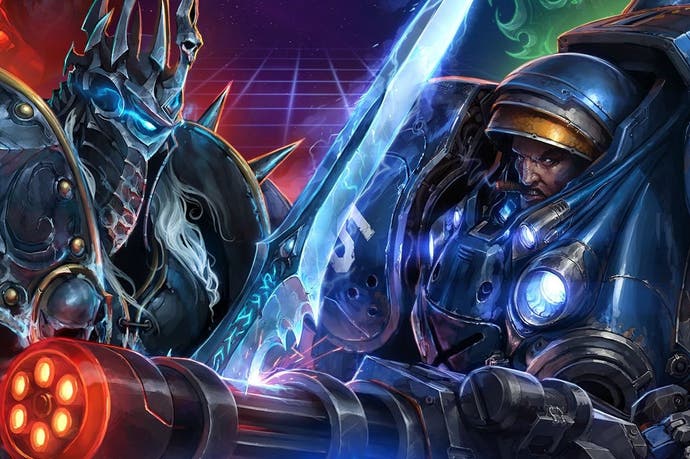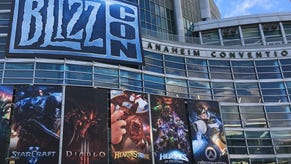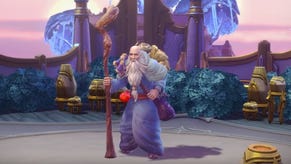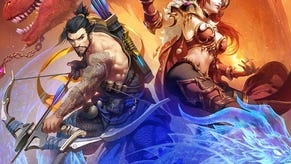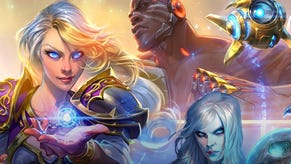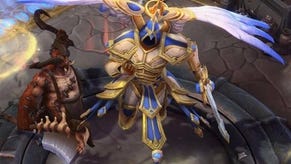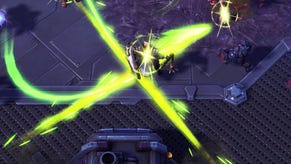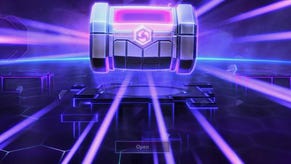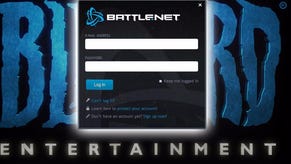Blizzard versus the hostility of MOBAs
"We will keep attacking this problem until it's gone."
MOBAs - or "online team brawlers", as Blizzard likes to call them, because every developer seems to feel the need to invent its own blanket term for these games - are the biggest games in the world, with one big problem. League of Legends and Dota 2 are fast-paced, skilful competitive games with great tactical depth, gigantic followings and a thriving eSports scene that can turn young players into stars. But they're not very nice places to be, especially for newcomers.
Of course, high tension and aggression go with the territory in a team sport, but MOBAs suffer in particular because they require coordinated teamwork across long, complex scenarios, yet they also encourage showboating and intra-team competitiveness. Combine this volatile mixture with the general standard of manners on the internet and you get a poisonous online environment where less skilled and experienced players - or even skilled and experienced players who are just having an off day - are cussed, humiliated and browbeaten with dispiriting relentlessness.
"We're not shy about this problem," says Dustin Browder down a crackly phone line from California. "I've joked with the team about removing team chat altogether - that was a less than popular idea! But we will keep attacking this problem until it's gone, or as gone as we can get it."
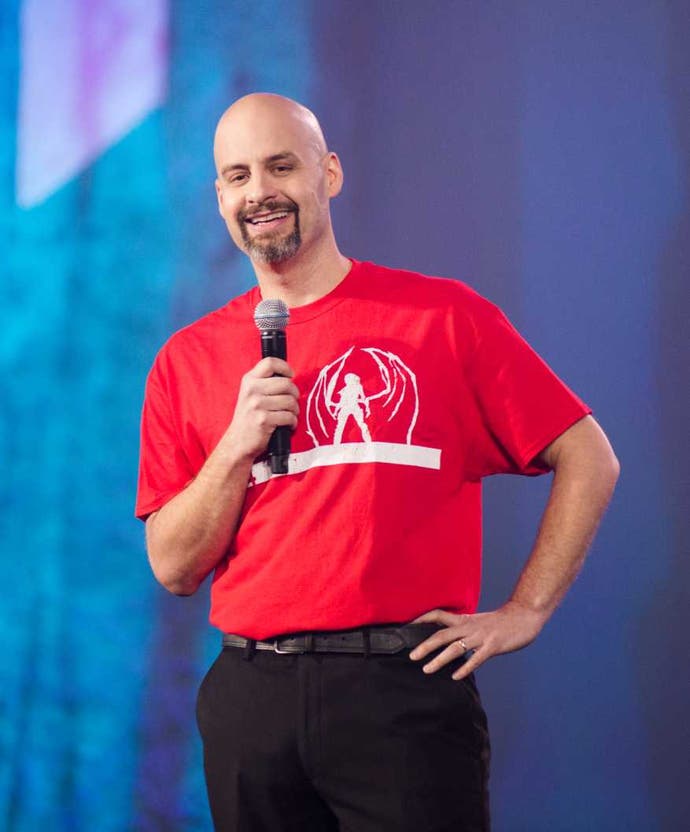
Browder knows a thing or two about competitive online games. He's a Command & Conquer veteran who served as lead designer and then game director on StarCraft 2. Now the effusive, fast-talking designer is the game director for Heroes of the Storm, Blizzard's own MOBA, which started life as an official StarCraft 2 mod and is being made by a (very large) subdivision of the StarCraft 2 team. Known as an expert balancer and technical designer, can he really design his way out of social problem?
"I don't entirely agree that you can't address this through game design," he says, picking up my gauntlet. "We've already made several stabs. So for example, there's no way I can last-hit and take the kill away from you and deprive you of your gold and experience, which could be a very frustrating moment for everyone involved: 'I didn't know that I wasn't supposed to kill that person, you're angry with me that I killed the wrong person, I'm just trying to kill people!' We've smoothed that out - the team levelling also smooths out a lot of that."
As in other MOBAs - in which teams of heroes battle both computer characters and each other to take down the other side's defences and control a map - in Heroes of your Storm your hero character levels up, unlocking new abilities, over the course of a single match. A key difference in Heroes of the Storm is that all the experience earned by a team goes into a single pool and team-mates level up together rather than individually.
"If you do the obvious thing, everything works out and you don't have to worry about hurting your allies. We're doing everything we can to remove the ability for players to hurt their allies. With a lot of the team levelling it's even difficult to feed aggressively - if you've got someone in there who's really terrible, you can support them with the team levelling system."
While "last-hitting" is a facet of the genre that seems to have hung around out of habit more than anything else - players of a certain disposition may miss it, but most can at least accept the logic for binning it - team levelling is a bigger, more philosophical change of gear for MOBAs, and it has been widely disputed. Checking out the alpha build of Heroes of the Storm for us, Dota 2 player Matt Lees argued that team levelling can leave the stronger players on a side feeling powerless and disconnected from the game, unable to improve their own chances.
"I violently disagree!" hollers Browder down the phone. "Shared XP is better for both new users and hardcore players. We actually did it for hardcore players initially.
"We had an individual experience point system for many years on this game, and when we started introducing the Battlegrounds" - unlike other MOBAs, Heroes of the Storm has multiple maps with very distinct, game-changing mechanics - "we started trying to provide our advance players with a lot more strategy in trying to engage with their opponents. One of the things we noticed is that players kind of refused to engage with the map mechanics of the Battlegrounds when they had individual experience, because they didn't want to leave their lane to go do something like drop off coins or collect tribute. They were too scared. We'd actually see arguments on the team - people would be saying, 'Well I'm not going to go drop off coins, you go drop off coins, you go get the tribute, I don't want to leave lane!'"
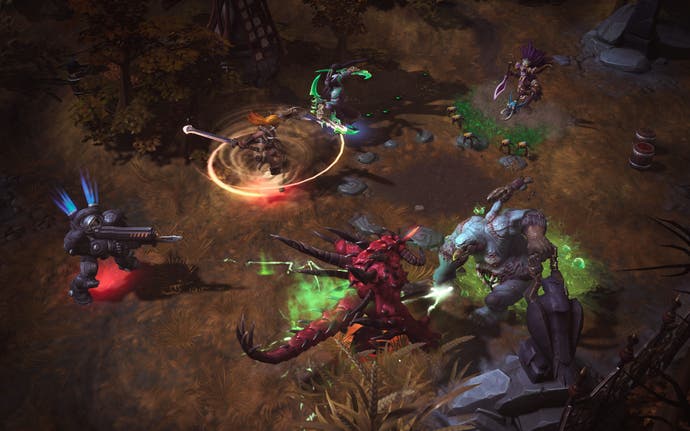
The developers decided to try team levelling as a fix, but they were sceptical. "We looked at each other and said, 'This is not going to be any fun. This is a huge waste of time. We're literally not going to notice the difference.' And we put it in, and of course, the difference was immediate and incredibly noticeable."
Browder is adamant that it's a good thing for skilled players. "It also has this huge benefit for high-end teams in the sense they can cross-lane support or cross-lane gank with a lot more freedom," he says, explaining how previously a player would have to decide between going for a strategic kill or staying in lane and levelling up. "Right now, if you're on a three-lane map and you have a player in each lane - if you've got three players dedicated to getting experience points from those battles - you have two players who can do whatever the heck they want. They can go support, they can collect map objectives, they can try to cross-lane kill other players, they can try to raid bases and destroy infrastructure in the back field, they can engage with mercenaries... The minute they put this system in, it opened up the map to tons of strategy, which we felt was fundamentally better for the game we were trying to make."
These aren't the only design changes Blizzard can make to soothe the fevered brow of the game community - quests that reward players on the basis of games played rather than won is another example - "But!" Browder explains, "I don't think that's going to be enough. Even in the alpha, when there's very little at stake, there's no ranked play at this moment, I still experience angry players from time to time. So I think there's more work to do." And the only ultimate solution to a social problem is, unsurprisingly, a social one.
"I think encouraging you to play with your friends is the most important way to attack this problem. If you play with your friends, you're not going to rage, if you play in a pick-up group you are." The "insanely rudimentary" social features of the alpha already include a large 25 per cent experience bonus for playing with friends. "We think absolutely the best way to play is with friends, the right way to play is with friends."
Blizzard is arriving late to MOBAs, when you consider that the genre had its genesis in mods for Blizzard games - first for StarCraft and then with the decisive Defense of the Ancients and DOTA: All-Stars mods for Warcraft 3. To begin with, Blizzard's attitude to companies like Riot and Valve running away with what it considered its own community was nervous and defensive - even leading it to the brink of a dispute with Valve over the Dota trademark. But in the inexorable shift of the company's weight behind Heroes of the Storm (known in previous, more modest incarnations as Blizzard All-Stars and Blizzard DOTA, and now sharing team resources pretty evenly with StarCraft 2) and in the increasing courage and invention of the game's design, it's showing a more positive attitude.
That includes a charm offensive with the core of the MOBA community - the streamers, shoutcasters and pro players - many of whom were in the first wave of invitees to the Heroes of the Storm alpha test a couple of months ago. Browder acknowledges that, for all Blizzard holds a firm belief in a tighter, friendlier and more egalitarian team game - "we compare it to volleyball" - it will need to do something to massage the egos of these rockstar players. The feedback from the alpha is clear on this point. "It's not the biggest surprise, but the one I'm certainly most worried about right now is that... a lot of players are feeling frustrated that they can't shine, they want to be a superstar. So there's a bunch of systems that we want to get into the game as soon as possible to see if they work. We've got some ideas towards that direction. We want to get them in and show players who's the best player in their game, who's a superstar right now, so we can get that feeling." (It's notable, though, that this is Browder's least detailed and passionate answer of the whole interview. You wonder if his heart is really in it.)
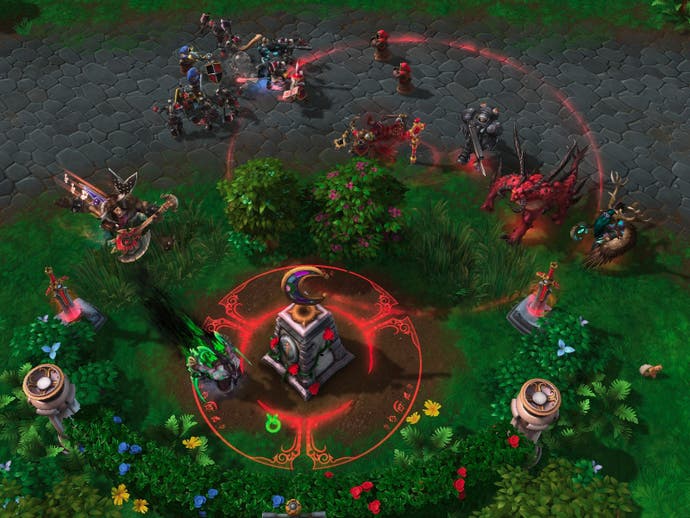
The most surprising thing about MOBAs is the size of the audiences they have built around quite difficult, obscure and hardcore games. Indeed, it's the elite appeal of these games at the highest level - which, really, means the pro gaming level - that seems to have founded their popularity, as hundreds of thousands of kids flock to watch match streams. Will a game that has been designed to be more accessible - with streamlined mechanics, shorter matches, smaller maps - really be able to trade punches with these heavyweights in the eSports arena?
Browder is modest, but palpably unconcerned. "For us, eSports is something that's going to happen if our community decides that we're ready for it. We're going to provide all the tools, we're going to provide replay, observer mode, reconnect from replay, leagues and ladders and all that stuff which enables the higher end of competitive play and enables the eSports folks if they want to make an eSport out of Heroes of the Storm. But it's really up to them, at the end of the day." To be fair, Blizzard has rich form in this area, and not just with the daunting StarCraft. With World of Warcraft's Arena mode, it performed the unlikely feat of digging a credible competitive game out of a crowd-pleasing MMO, and now Hearthstone: Heroes of Warcraft has the beginnings of a following - despite being a slow, turn-based game and a superficially simplified take on more highly evolved collectable card games like Magic: The Gathering.
"Hearthstone also made a lot of changes to what people expected of a genre," says Browder, saying its success has "absolutely" been an inspiration to the Heroes of the Storm team. "They came out and said, 'We know that a lot of you guys out there are going to look at that and say, you're just dumbing it down, you're not making it really deep or interesting and it's just for noobs' - which, to be fair, happened with World of Warcraft as well. It's certainly given us the courage to make some of the changes that we felt would be important to this game. We watched them go through that and come out the other side, where players see: 'Oh, I see, the complexity's here, it's just in different locations to what I'm used to, but there is a very competitive game here.' We want to have the same kind of experience."
You want proof? Browder will provide it, in a fusillade of words (too many to reproduce here) as he explains the synergy in the designs of Heroes of the Storm's ostensibly gimmicky Battlegrounds, its unusual heroes plucked from across Blizzard's properties, team composition and the heroes' deceptively simple talent trees. He explains how different maps will encourage different team behaviours, which will inspire different talent builds - maybe you'll want a talent for fighting multiple heroes at once on one map, but not another - as will the composition of the enemy team - are you fighting ranged or melee players?
"We're only early in the alpha, these strategies are not well understood yet, and I'm not a great player, but even at my level of play, I'm making talent choices based on the map, talent choices based on enemy team composition, and to a lesser extent right now but I think I should be doing more in this area, making talent choices based on my own team composition. So you're trying to figure out how to walk the line in talents between all these different variables. That's one of the things that Battlegrounds gives you, and of course it just gives you a ton of variation in gameplay. So you sit down in front of the game and think, oh, wow, I haven't played this map in a while, what are we doing here again? How does this work with this map and this team composition against that enemy team composition? What do we need to do differently? We're trying to create enough variation that you've got to think on your feet and be creative while you play."
Simple yet deep, competitive yet friendly - it's a tall order. And perhaps it's a strange quest in the first place: essentially, to popularise something that's already wildly popular. But Blizzard has had enormous success before, and more than once, by taking a game genre, reverse-engineering it and reassembling it so that it hums like never before. Maybe it won't topple League of Legends and Dota 2, but perhaps what this genre really needs isn't a new champion but a genuine alternative. One where you won't get shouted at.
